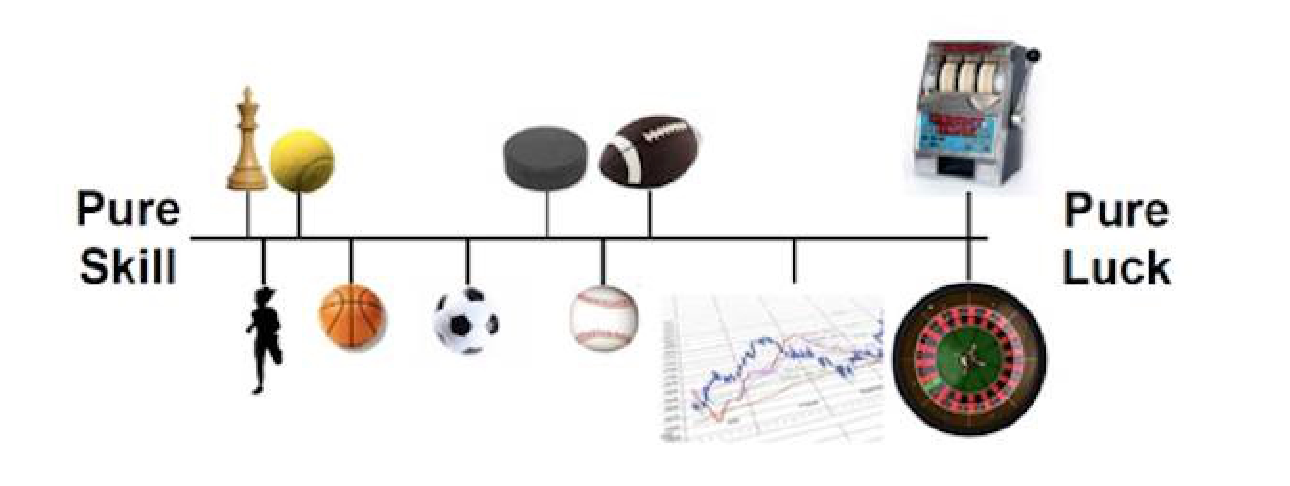How to avoid bad luck 如何避免厄运
When people achieve success in something, there are usually two factors at play:
当人们在某件事上取得成功时,通常有两个因素在起作用:
Skill 技能
Luck 运气
From this perspective, success can be expressed by a formula:
从这个角度来看,成功可以用一个公式来表示:
Success = Skill + Luck
成功=技能+运气
Here, luck could be either good or bad.
在这里,运气可能是好的,也可能是坏的。
In different activities, the proportions of these two factors can vary greatly. We can draw a line, with skill written on the far left and luck written on the far right, and different activities may fall on different points – the further left, the more reliant on skill and the less reliant on luck; and the further right, the more reliant on luck and the less reliant on skill. In extreme cases, some activities rely entirely on skill and not luck, such as chess or learning to run; while other activities rely entirely on luck and have nothing to do with skill, such as buying lottery tickets.
在不同的活动中,这两个因素的比例可能会有很大差异。我们可以画一条线,技能写在最左边,运气写在最右边,不同的活动可能落在不同的点上——越靠左,越依赖技巧,越不依赖运气;越靠右,越依赖运气,越不依赖技巧。在极端情况下,有些活动完全依靠技巧而不是运气,例如国际象棋或学习跑步;而其他活动则完全依靠运气,与技巧无关,比如买彩票。

The author of The Success Equation, Michael J. Mauboussin, proposed a clever and intuitive model to think about the relationship between skill and luck – for the sake of illustration, I made some modifications, so it can be considered as borrowing his model:
《成功方程式》一书的作者 Michael J. Mauboussin 提出了一个巧妙而直观的模型来思考技巧和运气之间的关系——为了便于说明,我做了一些修改,所以可以认为是借用了他的模型:
Imagine that we have two opaque bottles – the first one contains three blue balls labeled 1, 2, 3, representing skill; and the other bottle contains three red balls labeled -5, 0, 5, representing luck.
想象一下,我们有两个不透明的瓶子——第一个瓶子里有三个蓝色的球,分别标有 1、2、3,代表技能;另一个瓶子里有三个红色的球,标有-5、0、5,代表运气。
Now, we take out one ball from each bottle, and the sum of their values is the final result… So, there’s roughly a 1/3 probability that the result will be a negative value, which is similar to a person with mediocre driving skills speeding and encountering bad luck, resulting in a fatal accident – essentially, they are eliminated from life at that moment.
现在,我们从每个瓶子中取出一个球,它们的值之和就是最终结果……所以,结果大概有1/3的概率是负值,这类似于一个驾驶技术平庸的人超速行驶,遇到厄运,导致致命事故——本质上,他们在那一刻就被淘汰了。
If the first bottle contains three balls with values of 4, 5, and 6, representing three different individuals, then the person with a skill value of 4 has a 1/3 chance of “elimination,” while the person with a skill value of 6 is immune to “elimination” under any circumstances. If the skill values of the three individuals are 7, 8, and 9, then none of them would need to “eliminate” even in the worst case scenario. If we consider each draw of two different colored balls as a round of a series of competitions, then over the long term, the fluctuating luck will ultimately be balanced out. In the end, it is skill that plays a decisive role—assuming that the skill values are high enough not to be turned negative by bad luck.
如果第一个瓶子里有三个球,值分别为4、5、6,代表三个不同的个体,那么技能值为4的人有1/3的几率被“淘汰”,而技能值为6的人在任何情况下都免疫“淘汰”。如果这三个人的技能值是 7、8 和 9,那么即使在最坏的情况下,他们也不需要“消除”。如果我们把两个不同颜色的球的每次抽奖看作是一系列比赛的一轮,那么从长远来看,波动的运气最终会得到平衡。归根结底,技能起着决定性的作用——假设技能值足够高,不会因运气不好而变成负值。
Here, we are discussing the so-called “luck,” which is entirely uncontrollable – it could be good, bad, or “0”—meaning nothing happens. We do not know when it happens, whether it’s good or bad, or even the extent of its impact; we only know that in the worst case, bad luck can cause a “disastrous” outcome. In contrast, skill is controllable—most skills can be greatly improved through deliberate practice.
在这里,我们讨论的是所谓的“运气”,它是完全无法控制的——它可能是好的、坏的或“0”——这意味着什么都没发生。我们不知道它何时发生,是好是坏,甚至不知道它的影响程度;我们只知道,在最坏的情况下,运气不好会导致“灾难性”的结果。相比之下,技能是可控的——大多数技能都可以通过刻意练习得到极大的提高。
So, the logical response is to avoid bad luck through choice. Choice is crucial—it could be said that life itself is about choices. Regarding this matter, my good friend Tieling has an insightful statement: “Success, in the (business) world, is nothing more than an ace at solving a multiple choice question.”
因此,合乎逻辑的反应是通过选择来避免厄运。选择至关重要——可以说生活本身就是关于选择的。关于这件事,我的好朋友铁玲有一句很有见地的话:“成功,在(商业)世界里,无非是解决选择题的王牌。
However, there are many individuals in this world who do not believe that they have choices, or more accurately, they do not believe in the existence of free will. To be honest, I cannot understand why those who do not believe in free will would want to continue living.
然而,这个世界上有很多人不相信他们有选择,或者更准确地说,他们不相信自由意志的存在。老实说,我不明白为什么那些不相信自由意志的人会想要继续生活。
We can make better choices on two levels:
我们可以在两个层面上做出更好的选择:
- Increase skill value 增加技能价值
- Decrease the absolute value of bad luck
降低厄运的绝对值
Or to put it another way:
或者换一种说法:
On the “skill-luck” axis, strive to engage in activities closer to the left end, those that rely more on skill and less on luck.
在“技能-运气”轴上,努力从事更靠近左端的活动,那些更多地依赖技能而不是运气的活动。
Chess and learning completely depend on skill—purely on accumulation. At the same time, no matter what you do, skill is required and skill is only achieved through accumulation.
国际象棋和学习完全取决于技巧——纯粹是积累。同时,无论你做什么,都需要技能,而技能只有通过积累才能实现。
In other words: 换言之:
When the skill has not reached a certain level, don’t rely on luck because in such cases, bad luck is particularly frightening.
当技能还没有达到一定水平时,不要依靠运气,因为在这种情况下,运气不好是特别可怕的。
It took me a long time to organize this expression—first, it’s necessary to define clearly what Serendipity (what I refer to as “surprise,” commonly translated as unexpected good luck) really is, in order to distinguish it from the uncontrollable “luck”:
我花了很长时间来组织这个表达方式——首先,有必要清楚地定义机缘巧合(我称之为“惊喜”,通常翻译为意外的好运)到底是什么,以便将其与无法控制的“运气”区分开来:
So-called Serendipity is:
所谓的机缘巧合是:
- A good thing that “unexpectedly” happens…
一件“出乎意料”发生的好事…… - Or the unexpected absence of a bad thing…
或者意外地没有坏事…… - Or even if an unexpected bad thing happens, it does not result in a “catastrophic blow”…
或者即使发生了意想不到的坏事,也不会导致“灾难性的打击”……
Therefore, learning (honing skills) is always the most fundamental method of creating surprises.
因此,学习(磨练技能)始终是创造惊喜的最基本方法。
Originally posted 2024-04-06 08:32:39.
